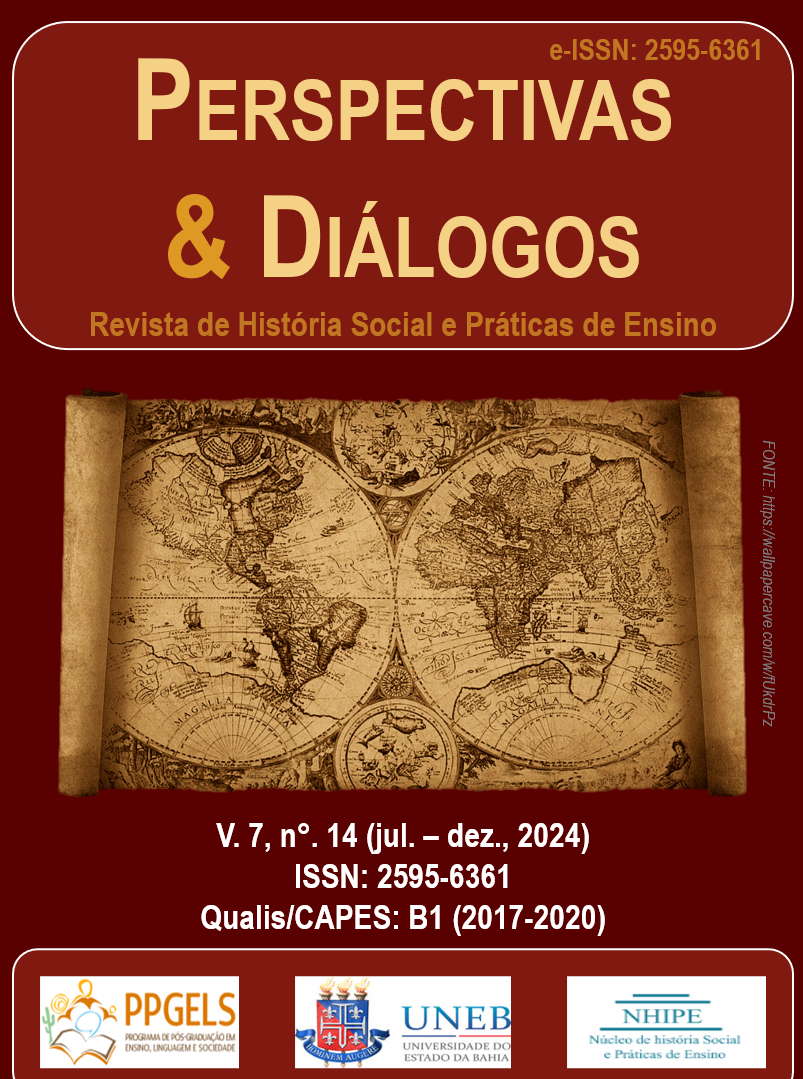The endless childhood: memories and voices of the cultural traditions of the backlands of Bahia
Keywords:
Memória, Escrita de si, Identidade, Cultura popular, OralidadeAbstract
This article aims to discuss how memories transmitted by ancestral knowledge of popular culture are constituted as spaces for the formation/reflection of subjects in their individual and collective experiences. Based on chronicles written by Eumara Maciel (2018), present in the book O sem-fim da infância, the aim is to reflect on how self-writing takes up elements of the land of the backlands, favoring the perpetuation of cultures inherent to this space-time. There is also the hypothesis that, despite being written literary productions, these chronicles bring characteristic elements of oral tradition literature, constituting hybrid texts full of subjectivities and representative of the memory of popular culture. The methodology used is qualitative, considering the importance of the relationships between subjects and the world around them and the social representations constructed from this relationship. The development of the proposed reflections relies on theoretical support from discussions on memory, self-writing, identity, popular culture, orality, and voice. Thus, it is possible to conclude by way of conclusion that the knowledge produced by popular culture plays a very important role in the constitution of the subjective identities of the subjects involved in it, making them at the same time authors and co-authors of this historically reproduced knowledge that per-forms the experience itself, taking up various voices from the margins that together construct a collective identity.
Downloads
References
ARANTES, Antonio Augusto. O que é cultura popular. 8. ed. São Paulo: Editora Brasiliense, 1981 (Col. Primeiros Passos 36).
ARAÚJO, Nerivaldo Alves. Na cadência das águas do Velho Chico:Poética oral do Samba de Roda de Ribeirinho. 2015. 223 f. Tese. (Programa de Pós-Graduação em Literatura e Cultura – PPGLitCult). Universidade Federal da Bahia. Salvador, 2015.Disponível em:<https://repositorio.ufba.br/handle/ri/22073>. Acesso em 10/12/23.
ARAÚJO, Nerivaldo Alves. O Velho Chico e suas bordas culturais: as vozes poéticas da canoa Sidó e outras personagens fantásticas do rio São Francisco no filme Espelho d’água.Anuário de Literatura. v. 26, p. 01-13, Florianópolis, Universidade Federal de Santa Catarina, 2021.
CATENACCI, Vivian. Cultura popular: entre a tradição e a transformação. São Paulo Em Perspectiva.Volume 15, Número 2, 2001.
DELEUZE, Gilles. Conversações (1972-1990). Tradução de Peter PálPelbart. 3.ed. São Paulo: Ed. 34, 2013.
DELGADO, Lucilia de Almeida Neves. História oral: Memória, tempo, identidades. 2. ed. Belo Horizonte: Autêntica, 2010.
DELORY-MOMBERGER, Christine. Biografia e Educação: figuras do indivíduo-projeto. Trad. Maria da Conceição Passeggi; João Gomes da Silva Neto; Luis Passeggi. Natal: EDUFRN; São Paulo: Paulus, 2008.
FERREIRA, Jerusa Pires. Cultura é memória. REVISTA USP, São Paulo (24): 114-120. Dezembro/fevereiro, 1994/95.
FERREIRA, Jerusa Pires. Cultura das bordas: edição, comunicação, leitura. Cotia, São Paulo: Ateliê Editorial, 2010.
FOUCAULT, Michel. A escrita de si. In: O que é um autor?. Lisboa: Passagens. 2004. p. 129- 160.
HALL, Stuart. Quem precisa da identidade? In: WOODWARD, Kathryn; SILVA, Tomaz Tadeu da; HALL, Stuart (Org.). Identidade e diferença: a perspectiva dos estudos culturais. Petrópolis, RJ: Vozes, 2000. p. 103-131.
HALL, Stuart. Aidentidade cultural na pós-modernidade. Tradução Tomaz Tadeu da Silva, Guaracira Lopes Louro. Rio de Janeiro: DP&A, 2005.
JOSSO, Marie-Christine. A experiência de vida e formação. Trad. José Claudio; Júlia Ferreira; revisão científica Maria da Conceição Passeggi. 2ª. ed. rev.eampl. Natal: EDFRN; São Paulo: Paulus, 2010.
LE Goff, Jacquess. História e memória/ Jacquess Le Goff; tradução Bernado Leitão... [et al] – Campinas, SP Editora da UNUCAMP, 1996. (Coleção Repertórios)
MACIEL, Eumara. O sem-fim da infância. Guaratinguetá, São Paulo: Penalux, 2018.
ORTIZ, Renato. Cultura brasileira e identidade nacional. 4. reimpressão da 5. ed. São Paulo: Brasiliense, 2003.
SILVA, Jorge Augusto. Contemporaneidades periféricas. Salvador: Editora Segundo Selo, 2018.
ZUMTHOR, Paul. A letra e a voz: A "Literatura" Medieval. Tradução Amálio Pinheiro, Jerusa Pires Ferreira. São Paulo: Companhia das Letras, 1993.
ZUMTHOR, Paul. Presença da voz: cinco entrevistas com André Beauded para a Rádio Canadá. In: _____________. Introdução à poesia oral. Tradução Jerusa Pires Ferreira, Maria Lúcia Diniz Pochat e Maria Inês de Almeida. São Paulo: Hucitec, 1997.
Downloads
Published
How to Cite
Issue
Section
License
Copyright (c) 2024 Claudia Lessa Alves Sousa, Cláudia Rocha Almeida

This work is licensed under a Creative Commons Attribution 4.0 International License.


